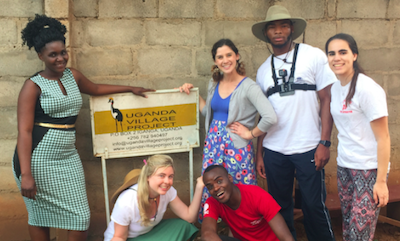In Uganda to Serve.

On a recent Friday afternoon, MPH student Emily Liebo stood up in front of about 100 people at a community meeting in the Ugandan village of Irenzi and introduced herself and the other interns from the Uganda Village Project (UVP).
“I explained we have education and experience that will facilitate a successful and powerful impact on their community, but I also needed to make sure they knew that without their knowledge, cooperation, and support we would get nowhere,” she says.
“The lead council member said, ‘These interns have flown all the way to Uganda, driven to the Iganga District, taken boda-bodas to the sub-county of Nambale, all the way to Irenzi—and now they are here to serve you.’”
Liebo is one of seven interns in Irenzi this summer with UVP, a nonprofit organization working to improve community health and well-being in the rural communities of Iganga District, an underserved area in southeast Uganda. Half of each UVP intern team is Ugandan, the other half international. Liebo is her team’s international lead, heading the group with Ugandan public health student Christine Bamwoze.
The team will conduct a baseline assessment of health in Irenzi around HIV, family planning, malaria, obstetric fistula, water safety, sanitation, and hygiene. Then they will implement interventions to help improve each of those areas, focusing on what the baseline assessment reveals. “It’s the village members and their verbalized needs that will make this internship mutually beneficial,” Liebo says.
Liebo had arrived in Uganda two weeks earlier for an orientation with all of the lead interns in Iganga town—the only town in the district. After a crash course in the region’s dominant language (Lusoga) and culture, and a workshop to prepare for managing a mixed team of Ugandan and international interns, the team leads went to their villages for the first time.
Liebo and Bamwoze took boda-bodas—motorcycle taxis—to Irenzi, past fields of corn, rice, and sweet potatoes. “It’s a village of 340 households and each household has 6 to 10 people, so it’s a pretty large village,” Liebo says.
First, she and Bamwoze met with Irenzi’s six-person Village Health Team (VHT). “VHTs were created by the Ugandan government and are appointed by the government because the healthcare system doesn’t provide the villages with adequate healthcare,” Liebo says, “so the government appoints village members to monitor and educate the villagers on certain health topics. Us interns will be working very, very closely with the VHTs of Irenzi.”
Next, she and Bamwoze toured the village with the VHTS— the borehole where Irenzi gets its drinking water, the primary school, the Catholic church, the mosque, the house the seven interns will share—and met as many people as possible.
Soon the other interns arrived, and the team moved in and got to work. The group toured the village, met with the lead councilor, mayor, treasurer, secretary, and VHTs, and visited the sub-county’s health center about four kilometers from Irenzi. For their own house, the interns built a pair of tippy taps—a hands-free hand-washing set-up to use in places without running water—for after using the latrine and before meals.
That Friday community meeting ended the first full week in Irenzi, and provided a “gust of energy” for what was to come, Liebo says. After introducing the interns, the meeting shifted to a discussion between the team and the community members, with questions, answers, and suggestions coming from all sides. “It felt like I was doing something right,” Liebo says. “I felt like a part of that community.”
She says this is shaping up to be exactly the experience she wanted: to help improve a community’s health from the inside, fully immersed in a way that would let her learn as much as possible about the relationship between health and everything else. “The field of public health has made me realize medicine is so much more than suturing a wound,” Liebo says. “It’s the application of society, religion, education, perspectives, and community needs to understand the foundations of health.”
Emily Liebo is taking over the SPH Instagram account from July 10 through 14 to share photos from Uganda. Follow along at Instagram.com/BUSPH/.
Comments & Discussion
Boston University moderates comments to facilitate an informed, substantive, civil conversation. Abusive, profane, self-promotional, misleading, incoherent or off-topic comments will be rejected. Moderators are staffed during regular business hours (EST) and can only accept comments written in English. Statistics or facts must include a citation or a link to the citation.